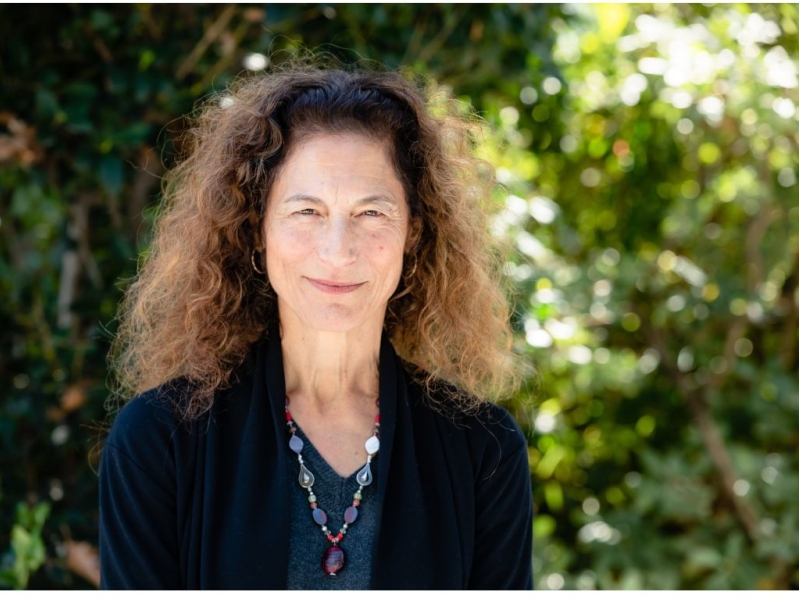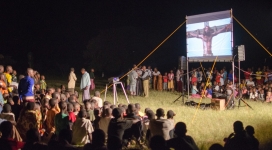As a pastor and professor, Dr. Alexia Salvatierra has 38 years of pastoral experience and has been deeply involved in and spiritually influential within Latino immigrant churches in the United States. In a recent interview with The Gospel Herald, she reflected on her research on Latino immigrant churches, explored the intergenerational tensions within immigrant churches, and shared how dialogue and reconciliation can bridge these generational divides. Her insights are not only guiding for Latino immigrant churches but also offer profound lessons for Asian American churches.

Q: You were invited as a keynote speaker at the Global Chinese Mission Conference 2024. What was the theme of your presentation?
Dr. Alexia: I gave two presentations, and each focused on a different generational group within the immigrant community. The first presentation was aimed at the immigrant generation, while the second focused on what we call the "second generation"—the young people who were brought to the United States as children or who were born here.
While our research has covered Latin America, I wasn’t focusing too much on that in these presentations. However, I did touch on the fact that generational tensions are evident everywhere, though they seem more pronounced in the United States. The challenges that we’re seeing here are particularly acute.
The generational divide is striking. For instance, 49% of Millennials and Generation Z in the U.S. no longer identify as Christian—almost half. This has been growing over the last 15 years, with a 12% increase in the general population and 10% in the Latino community. The situation in the Latino community is unique, though. When a young person says they’ve stopped identifying as Christian, it doesn’t always mean they’ve completely abandoned their faith. Many still hold deep respect for their grandparents' and parents' faiths, and some even continue to believe, but they feel disconnected from the Church.
For those who still identify as Christian, only about 30% of them actively attend church. This shows a clear rift not just in belief but in active participation. From our research, we identified three key factors contributing to this issue.
The first is the perception that older generations in the Church are rigid and unsympathetic to the challenges young people face. Many of the young people who distance themselves from their parents' church still feel emotionally connected to the faith but feel hurt because they think the older generation doesn’t understand the changing world or the need for new approaches to missions. They also feel that the Church doesn’t trust them, even though many young believers have strong faith and a desire to lead. This lack of trust leads them to leave their home churches and join large, predominantly white megachurches. However, in those spaces, they often find themselves marginalized. Their leadership is not recognized, and cultural differences make them feel invisible. Latino young people tend to be more modest and don’t promote their achievements as openly as others, which leaves them unnoticed. Over time, they become disconnected from both their new church and their immigrant church, leading many to eventually lose their faith.
The second factor is intermarriage. About 35% of Latino Millennials are intermarried, and in immigrant churches, their spouses often feel like second-class members. Language barriers, cultural differences, and unfamiliar customs create an environment where they don’t feel fully welcomed or valued, even though they’re not outright rejected. This issue is even more pronounced for non-white spouses, who may feel even more excluded.
These generational misunderstandings, lack of trust in young leaders, invisibility in new church environments, and cultural barriers in intermarried families are serious challenges. They contribute to the growing number of young people distancing themselves from the Church.
Q: You pointed out the problem—and this generational divide is very common in immigrant churches of other ethnic groups as well. Are there any solutions?
Dr. Alexia: In my second presentation, I addressed how both older and younger generations need to change. To the young people, I pointed out that we live in a graceless society where mistakes can lead to quick judgment. I urged them to approach their parents and grandparents with compassion and respect, emphasizing the importance of having grace for the shortcomings of the older generation. I encouraged them to try to understand their elders empathetically, in order to build a relationship of mutual appreciation and collaboration.
I reminded them that one can be both right and wrong at the same time. While they may be right in calling for a new vision and mission, they could be wrong in their attitude if they lack humility and compassion. The word "compassion" comes from two Latin words: com (with) and passio (to suffer). When Jesus showed compassion, He truly felt the pain of others as if it were His own. I encouraged both generations to practice this kind of compassion, truly empathizing with each other, if they want to heal the deep rift between them.
I was deeply moved by the response. Both older and younger generations expressed genuine repentance. The older generation, in particular, had not fully understood how deeply hurt the younger people felt. They had seen their alienation as rebellion rather than as a wound caused by feeling unheard and undervalued. But once they recognized this, they acknowledged it, and I believe that acknowledgment is the first step toward healing these relationships.
After the presentation, we held a time of prayer. I invited anyone who felt led to repent for their role in the division to come forward. In that first session alone, 30 to 40 people came forward, falling to their knees and crying out to God.
Throughout the day and the next, people—both older and younger—came up to me, sharing how God had spoken to them. Many older individuals told me they had called their adult children for the first time to apologize. They shared how they had wept together and committed to rebuilding their relationships. It was truly incredible to witness the Holy Spirit moving powerfully, bringing recognition and repentance.
There was a deep awareness that Jesus was calling us to reconciliation across generational divides. People realized they were being called to extend grace and compassion to one another, truly seeing and understanding each other. More than that, they recognized the mission potential in working together—uniting the unique gifts each generation brings to the Church.
This was a key part of my message—not just identifying the problems, but also highlighting the great things that can happen when different generations come together. When the wisdom and experience of the older generation are combined with the vision and energy of the younger generation, they can accomplish incredible things for the gospel. This unity has the power to transform communities and reach the world for Jesus Christ.
Q: You mentioned an example of successful intergenerational reconciliation in a Latino church during the conference. What was it specifically?
Dr. Alexia: is the story of the Molina family and their church. We first met the Molina family through Fuller Seminary. The father, Rene Molina Sr., immigrated to the U.S. and built a thriving immigrant church in South Los Angeles. Starting with just ten members, he grew the congregation to 2,500. Though he had strong leadership skills and deep faith, he lacked formal theological training, so he enrolled at Fuller. Later, his son, Rene Molina Jr., also attended Fuller, and over time, their relationship evolved in significant ways.
Rene Sr. invited us to Fuller to help assess the effectiveness of their church’s mission to the community. As part of this process, the congregation engaged with their neighbors to discern God’s calling for their ministry. Before our involvement, Rene Jr. had already started an English-language service to reach younger people, including intermarried families. This new service grew to about 300 attendees.
However, as we studied the church together, we discovered something striking: the English service was not advertised anywhere—not on the website, not on the front sign. Digging deeper, we realized this was due to the immigrant generation’s mixed feelings about the service. Many parents and grandparents were uncertain about the younger attendees, who came with tattoos, large earrings, and a style of worship that included Christian rap. While the older generation tolerated the service, they did not fully embrace it as part of their ministry.
When this issue was finally addressed openly, it led to a painful but necessary conversation. Instead of continuing to live side by side with quiet resentment, the two generations confronted their differences and communicated. Through intentional effort and humility, they worked hard to bridge the gap.
Both Rene Sr. and Rene Jr. acknowledge that this process hasn’t been easy, nor is it always perfect. But they’ve come to deeply appreciate one another. Rene Jr. had a vision for blessing their community through new outreach efforts. Today, their church operates a coffee house, a tutoring program for children, and a community aid initiative that distributes furniture and other necessities. These ministries have brought people to Christ in ways Rene Sr. admits he never could have imagined. "I would have no idea where to start," he says. "My son has all these ideas, skills, and knowledge that I never had."
At the same time, Rene Jr. recognizes the invaluable wisdom of his father. "My father has the stability," he says. "He has the fire of faith that warms me, inspires me, and teaches me. I have so much to learn from him."
Despite their progress, they emphasize that maintaining unity requires commitment. They must constantly engage in open dialogue, practice humility, and listen to each other. They have also implemented key strategies we teach at Fuller for fostering intergenerational relationships in the church. These strategies fall into three main areas:
-
Listening and Relationship Building – The foundation of their approach is a commitment to listening with humility. This includes initiatives like intergenerational church dinners, where members from different age groups sit together, answer conversation prompts, and form genuine relationships—not just through lectures but through shared experiences and dialogue.
-
Mentoring – Effective mentoring must be rooted in mutual respect and service. This can take many forms: peer mentoring, family mentoring, and older couples mentoring younger couples on how to integrate family life with ministry. A crucial part of this process is intentionally recognizing the spiritual gifts of young people, even when their expressions of faith look different. Older leaders must make an effort to see how the Holy Spirit is working in younger generations and invest in developing them as leaders.
-
Opportunities for Leadership – Young people must be given meaningful roles in the church. This can start in small settings, such as home Bible studies (cell groups), where they can lead in a less intimidating environment while receiving feedback. They should also be encouraged to participate in worship leadership and take charge of community outreach initiatives. Importantly, their outreach should respect the cultural values of both young people and their parents. For example, if young leaders run a tutoring program for children, the church should also find ways to engage with the parents to honor family connections.
The Molina family’s journey is an ongoing process of trial and adaptation. They acknowledge that much of their work involves experimenting, evaluating, and adjusting as needed. But their dedication has paid off—both the Spanish and English services have grown, and their church is reaching the community in ways that would not have been possible without embracing the strengths of both generations.
Q: Your research findings are highly valuable for immigrant churches, especially those experiencing generational divides. In your study, have you found any biblical teachings related to intergenerational leadership?
Dr. Alexia: There is a powerful biblical lesson that highlights the importance of raising young leaders—and the consequences of failing to do so. Take the story of David, Goliath, and King Saul. When David steps up to fight Goliath, Saul offers him his armor, but David refuses. He knows he must fight in his own way. Saul does the right thing—he steps back and lets David face the battle on his own terms. Because of this, David defeats Goliath and brings victory to Israel.
However, Saul later fails to maintain this supportive role. Instead of continuing to invest in David, he grows jealous and insecure, eventually turning against him. In doing so, he not only loses his connection to David but also to God. David still becomes king, but imagine how much stronger he could have been with Saul’s continued mentorship.
This contrasts with Paul and Timothy’s relationship. Paul intentionally invests in Timothy, guiding him in faith and leadership. Likewise, Timothy’s mother and grandmother play a key role in shaping his spiritual life. Their story is a beautiful example of how wisdom and faith should be passed down across generations.
We all know God calls us to work together across generations. The challenge is that it requires change, and change is difficult. But if we resist, we risk repeating Saul’s mistakes instead of following the example of Paul, Timothy, and the faithful generations before us.







